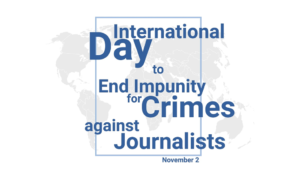
International Day to End Impunity for Crimes Against Journalists – November 2, 2025
Every year, November 2 is observed globally as the International Day to End Impunity for Crimes Against Journalists. It is a day that calls upon governments and societies to ensure accountability for the threats, harassment, and murders faced by journalists. For Sri Lanka, this day carries deep and painful meaning.
A History Written in Fear
Over the past three decades, Sri Lanka’s media landscape has been marked by courage, sacrifice, and tragedy. Journalists have faced intimidation, surveillance, arbitrary arrests, and, in the worst cases, abduction and assassination.
Names like Lasantha Wickrematunge, Prageeth Ekneligoda, D. Sivaram (Taraki), and Richard de Zoysa are etched into the nation’s conscience, powerful voices silenced for their commitment to truth. Many others, especially regional journalists, have suffered in silence, their cases unreported and justice denied.
Despite public promises and inquiries, most of these cases remain unresolved. All governments have failed to hold perpetrators accountable, sending a chilling message that journalists can be attacked with impunity.
The Continuing Climate of Threats
While open violence against journalists has declined since the end of the civil conflict, threats and intimidation continue in new forms through online harassment, politicized lawsuits, and state surveillance. The introduction of restrictive laws such as the Online Safety Act No. 09 of 2024 has raised further alarm about potential misuse to curb dissent and limit press freedom.
Investigative journalists who expose corruption, land grabs, or police abuse continue to face social and professional risks. Many regional reporters still operate without institutional protection or access to legal support.
The Human Cost of Impunity
When a journalist is silenced, an entire community loses its voice. Impunity not only endangers individual reporters but also weakens public trust in institutions and democracy itself. It fosters a culture of fear where truth is replaced by propaganda and accountability fades into silence.
Calls for Justice and Reform
Civil society organizations, including the Right to Life Human Rights Centre and the Journalists for Rights network, continue to request transparent investigations into past and ongoing cases.
Key requests include:
- Reopening long-stalled investigations into the murders and disappearances of journalists.
- Strengthening the independence of the Attorney General’s Department and law enforcement agencies to pursue cases without political interference.
- Ensuring that new legislation upholds freedom of expression and the safety of media workers.
- Providing legal aid and psychosocial support to journalists and their families facing harassment and violence.
A Collective Responsibility
Ending impunity requires more than commemorating victims, it demands political will and public solidarity. Every journalist silenced diminishes our collective right to information. Every act of intimidation that goes unpunished emboldens future perpetrators.
On this International Day to End Impunity for Crimes Against Journalists, we remember those who paid the ultimate price for speaking the truth. We also call upon the government, media institutions, and citizens to stand together in defending press freedom and ensuring that justice is not delayed, denied, or forgotten.
